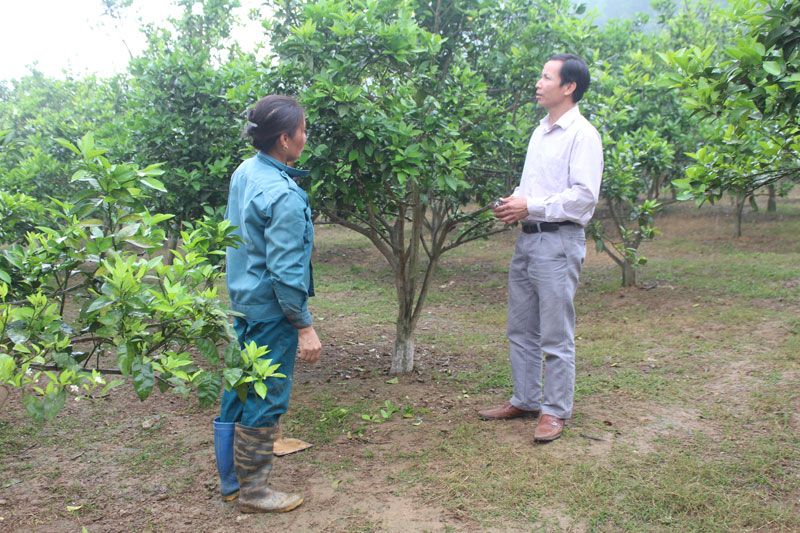
(HBO) – Hoa Binh has adopted various policies over recent years to develop products which the province has competitive edges of, in response to a national agricultural restructuring project which seeks to increase added value for the agriculture and foster sustainable development and new-style rural building.
The province
has formulated and amended nine agricultural restructuring plans and issued 25
others for the development of specific sectors, sub-sectors and products in a
bid to foster the comprehesive growth of the agriculture, expand added-value
and respond to climate change.
 Villagers in Phu Thanh commune, Lac Thuy
district shift to safe orange farming in response to agriculture restructuring policy.
Villagers in Phu Thanh commune, Lac Thuy
district shift to safe orange farming in response to agriculture restructuring policy.
Particularly,
the province has given priority to the cultivation of citrus fruits, clean vegetables and sugarcanes. It is now home to 10,500 hectares of citrus
fruits, including over 6,600 hectares as commercial farming which can generate
up to 120,000 tonnes.
A total of 14
farms in the province, with a combined of about 271 hectares, have met food safety standards and been qualified
for organic and VietGAP production.
Between 2017
and 2019, over 7,000 hectares of low-yielding rice and crops have been
transformed into the land for the cultivation of other crops with higher productivity.
There is an
increasing number of large-scale livestock farms raising high-yielding amimals
which use advanced farming techniques and disaster-free practice.
The province
has focused on intensive farming of cattle, pig, poultry and goat. By the end of this year’s first
quarter, the province has had 129 farms, including 41 for pig farming, 71 for
poultry, 14 for goat, and three for cow.
The province
has expanded areas of hardwood and indigenous trees as part of its plan to restructure forestry
sector while shifting to thefarming of high-value fishery varieties./.
The Standing Board of the Hoa Binh provincial Party Committee has agreed in principle on a proposal by the Standing Board of the Party Committee of Hoa Binh city to gather feedback on the city’s 1:2000 zoning plan, which forms part of its broader urban development strategy.
Hoa Binh province has made notable progress in public administration reform and digital government development, with the satisfaction index among citizens and businesses reaching over 84%, according to recent government evaluations.
Thanks to great efforts by local authorities in recent times, the governance and public administration performance of Mai Chau district has been significantly improved.
In the afternoon of June 6, the Party Committee, the People's Council, the People's Committee and the Fatherland Front of Lac Son district solemnly held a meeting to celebrate the 139th anniversary of the district's founding (1886–2025) and the 79th anniversary of the establishment of the district's Party Committee (1946–2025). There was the attendance of Mr. Bui Van Thang, the Vice Chairman of the Provincial People's Council; Mr. Quach Tat Liem, the Vice Chairman of the Provincial People's Committee; Ms. Dang Bich Ngoc, the Deputy Head of the National Assembly Delegation of the province; as well as the former leaders of the province and district through various periods, who are the natives of the district.
Implementing the Politburo’s Resolution No. 57-NQ/TW on breakthroughs in science – technology, innovation, and digital transformation is a golden opportunity for the northern mountainous province of Hoa Binh to renew growth model, improve competitive edge and shorten digital gap.
Resolution 57-NQ/TW, issued by the Politburo on December 22, 2024, identifies sci-tech, innovation, and digital transformation as strategic breakthroughs to build a developed and prosperous nation. In Hoa Binh province, this spirit is not just a slogan, it’s being put into action through concrete initiatives that form a "new development triangle”: digital citizenship, digital economy, and digital administration.



 Villagers in Phu Thanh commune, Lac Thuy
district shift to safe orange farming in response to agriculture restructuring policy.
Villagers in Phu Thanh commune, Lac Thuy
district shift to safe orange farming in response to agriculture restructuring policy.